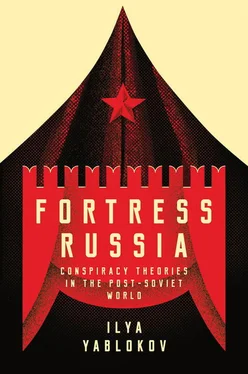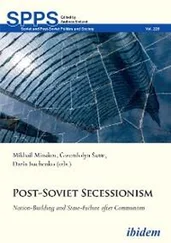Surkov’s efforts were not in vain. By the mid 2010s, the notion of the USA as Russia’s main enemy had become an essential part of the political and even educational discourse. As Golunov (2015) suggests, the idea that the USA was the main anti-Russian protagonist in conspiracy theories became extremely popular in Russian textbooks on geopolitics. These adopted Western European and American conspiracy theories about the New World Order to emphasize that Russia was encircled by enemies in cahoots with one another to achieve one simple aim: to destroy the regime and divide the country into puppet states. At the same time, the long-term project on the part of the Kremlin’s leaders to engage young people in nation-building project failed and was replaced by a more efficient and instrumental plan – to suppress opposition by force. In 2016, the Kremlin established the National Guard, headed by Putin’s closest aide and former head bodyguard, Viktor Zolotov (Rozhdestvenskii et al., 2016). After the series of street protests in spring 2017, Zolotov reiterated Surkov’s concern about foreign invasion: there could be no genuine domestic protests against the regime. Whenever people took to the streets, patriots needed to watch out for foreign subversion and for attempts at brainwashing by the foreign media (Interfax, 2017).
A campaign to bring together a highly diverse and fragmented population in a bid to achieve national unity was actually used to prevent the possibility of a colour revolution taking place in Russia during the election campaigns of 2007–8. Hence the Kremlin was actually trying to use the aim of national unity to boost political mobilization in support of the political establishment. A sense of belonging to a national community of Russians has been fostered by the constant reiteration of who Russia’s enemies are, both inside and outside the country.
During the following electoral cycle, in 2011–12, nation-building strategies were deployed in pursuit of the same goals, and repeated the main narratives of anti-Western conspiratorial discourse, which featured in the earlier period. However, the unexpected wave of civic activism significantly radicalized the Kremlin-sponsored debates on Russian national identity. In other words, these debates became directly linked to the goal of legitimizing Putin’s victory. The Pussy Riot performance became a key issue in debates about Russian identity, which highlights with particular clarity how instrumental the shifts in defining this identity actually were. Conspiracy theories about Pussy Riot’s threat to Russian identity were used to link the band’s supporters with people protesting against election fraud, both of whom were portrayed as a minority. At the same time, the state-aligned media portrayed the various people attending rallies in support of the Church as an undifferentiated Orthodox mass who supposedly constituted the majority of ‘the people’; these were said to be ready to protect their faith and their statehood (Kashin, 2012a).
The Pussy Riot trial seems to have had a significant impact on the model of national identity which the Kremlin started to promote during Putin’s third term. The campaign against the members of the band included several defining features with which the authorities could define the supposed majority of ‘genuine’ Russians and the minority of conspiring enemies. The representation of Pussy Riot as sexual perverts working in collaboration with homosexuals, as militant atheists and as opponents to Putin, contributed to the launch of a homophobic campaign in 2013. This was actively supported by the state media and reached its peak in the introduction of a law prohibiting the promotion of ‘non-traditional forms’ of family among young people (Spetsial’nyi correspondent: Litsedei, 2013). This campaign, along with other political measures, highlighted a turn to a Kremlin-sponsored celebration of so-called ‘traditional values’ ( traditsionnye tsennosti ), which were, allegedly, inherited by the Russian people from their ancestors (Putin, 2012a). Moreover, an increase in the punishment for insulting religious feelings, which was a direct consequence of the Pussy Riot affair, became one of many ways in which the state could prevent expression of dissent.
Newly introduced federal laws, as well as opinions expressed on numerous television programmes, are examples of this drift towards radical conservatism, and help create the impression that Russia is under siege by its enemies. An opinion poll carried out in November 2013, on the eve of the Ukraine crisis, showed that 78 per cent of Russians believed that Russia had enemies (Levada-tsentr, 2013c). This view, actively encouraged by the state-aligned media, is generated above all through conspiracy theories. Hence despite their long-term destabilizing potential, during Putin’s third presidential term, the ruling elites turned conspiracy theories into an important instrument for achieving social and national cohesion. This became even more mainstream during the Ukraine crisis two years later.
5
Battling Against ‘Foreign Agents’
By the mid 2010s, all of the main spheres of social and political life were influenced by the idea of a conspiring group of people eager for power and wealth. Yeltsin’s attempted impeachment, which was based on conspiratorial notions, was a remarkable episode in domestic political life, with conspiracy theories being used to demonize political opponents. In the 2000s the significance of conspiratorial discourses in the public sphere increased still further and became a pivotal element in several political campaigns which changed the course of Russia’s political development. The conspiratorial notions served as pretexts for initiating lawsuits and justifying criminal cases against political opponents, at times culminating in legislative changes which have affected the democratic processes in the country.
The campaign against the oil company Yukos and its management, and three campaigns against non-governmental organizations (NGOs) in 2005, 2006 and 2012–13, are the focus of this chapter. They were important milestones in the history of post-Soviet Russia. The Yukos affair sent an important message to the business community and to various law enforcement services; it demonstrated how the state should deal with rebellious businessmen, and what should happen to overambitious entrepreneurs. In turn, the cases against NGOs resulted in changes in Russian legislation regarding third sector organizations and had a harmful impact on the development of civil society. The origins of the campaign against the NGOs can be traced to the shock experienced by the ruling political elites in relation to the ‘Orange Revolution’ in Ukraine in 2004, and again, later, in response to the massive rallies for fair elections in the aftermath of the parliamentary elections in 2011. The Russian leadership acknowledged the crucial role which NGOs had played during regime changes in the CIS countries. Consequently, through the work of loyal public intellectuals and the media, the activities of NGOs were interpreted through the prism of conspiracy ideas about the West’s interests and this prepared the ground for the implementation of a highly repressive set of laws against NGOs. These newly introduced restrictions were sufficient to impede the work of NGOs in the country, and in the Kremlin’s view, this would help it to ensure control over society.
The wave of political protests against Putin in 2011–12 (discussed in Chapter 6), which occurred despite the government’s preventative measures, resulted in still more negative attitudes towards NGOs on the part of pro-Kremlin intellectuals and politicians, who described them as key facilitators of unrest. In 2012, a law was passed which required all NGOs with any foreign funding to register voluntarily as ‘foreign agents’. This had been preceded by a long-running campaign which attempted to establish a link between NGOs and the idea of a ‘fifth column’ operating within the country, which conspired to destroy the sovereignty of the country and its people.
Читать дальше
Конец ознакомительного отрывка
Купить книгу












